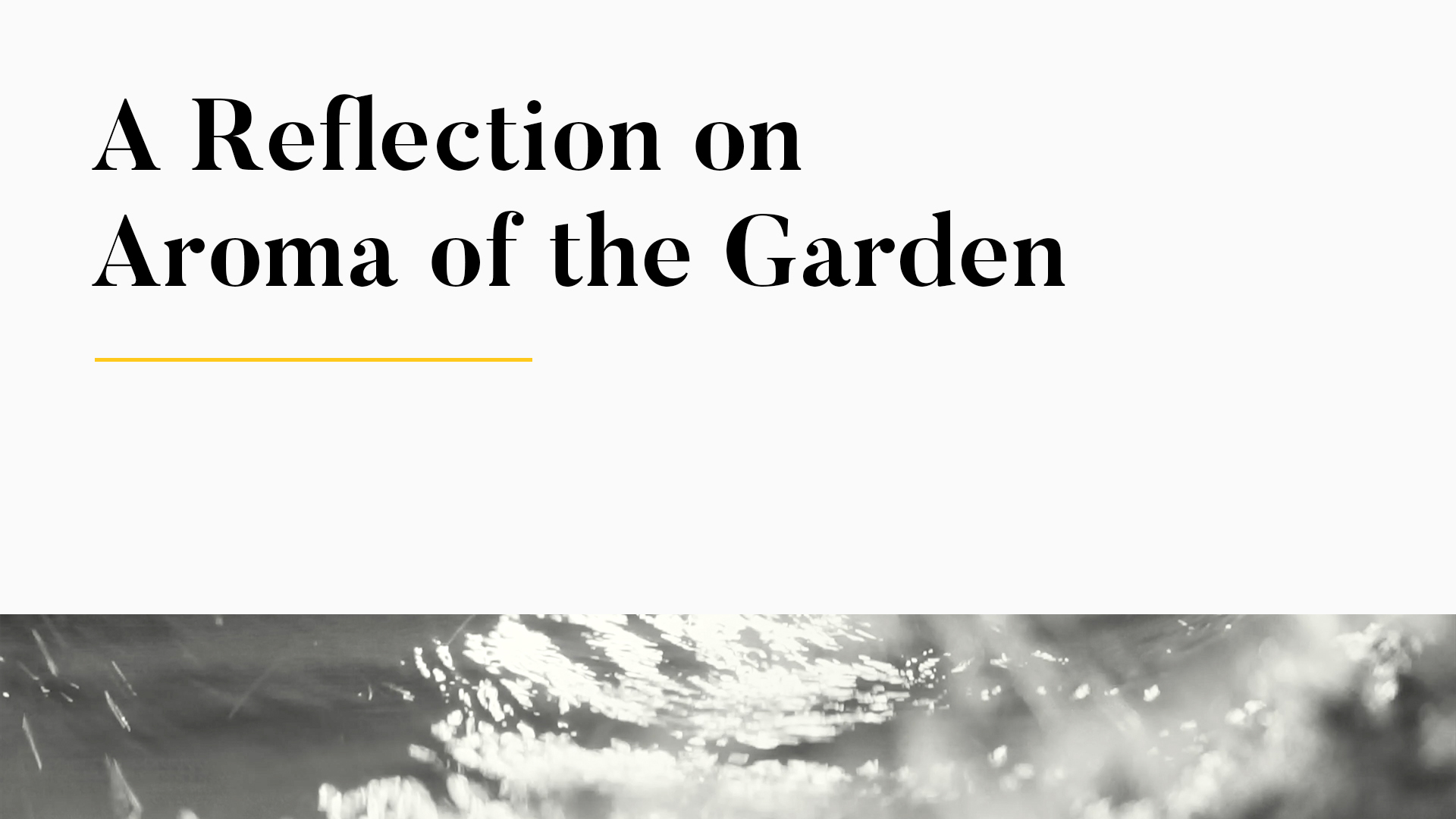You can watch the short film here if you haven’t yet.
I find Aroma of the Garden really difficult to describe or summarize. Perhaps that’s why I did want to work on the project, to try to capture the heart of it without using just words.
Aroma of the Garden is the most ambitious personal project I’ve gotten to work on yet, a byproduct of my film professor’s challenge to make a short film by the end of 2018 after my graduation in May (that self-imposed deadline was quickly ignored, however).
Shot over the span of two days in mid-August last year, the project was in a constant state of limbo and incompleteness for almost a year, until I couldn’t bear the thought of abandoning an unfinished project.
Looking back on it, there are a million (plus) things I would’ve liked to have done differently or wish I could’ve done better on. At the same time, I could not be more grateful for the team I’ve gotten to work with, in addition to the interesting and diverse feedback I’ve received so far regarding the film.
About the Film
Aroma of the Garden I think was partly inspired or motivated by Chasing the Sun (my previous short film for my last semester of college). That project was about experiencing the different moments involved with immigration and feelings of exile in a more abstract way that was meant to evoke those senses.
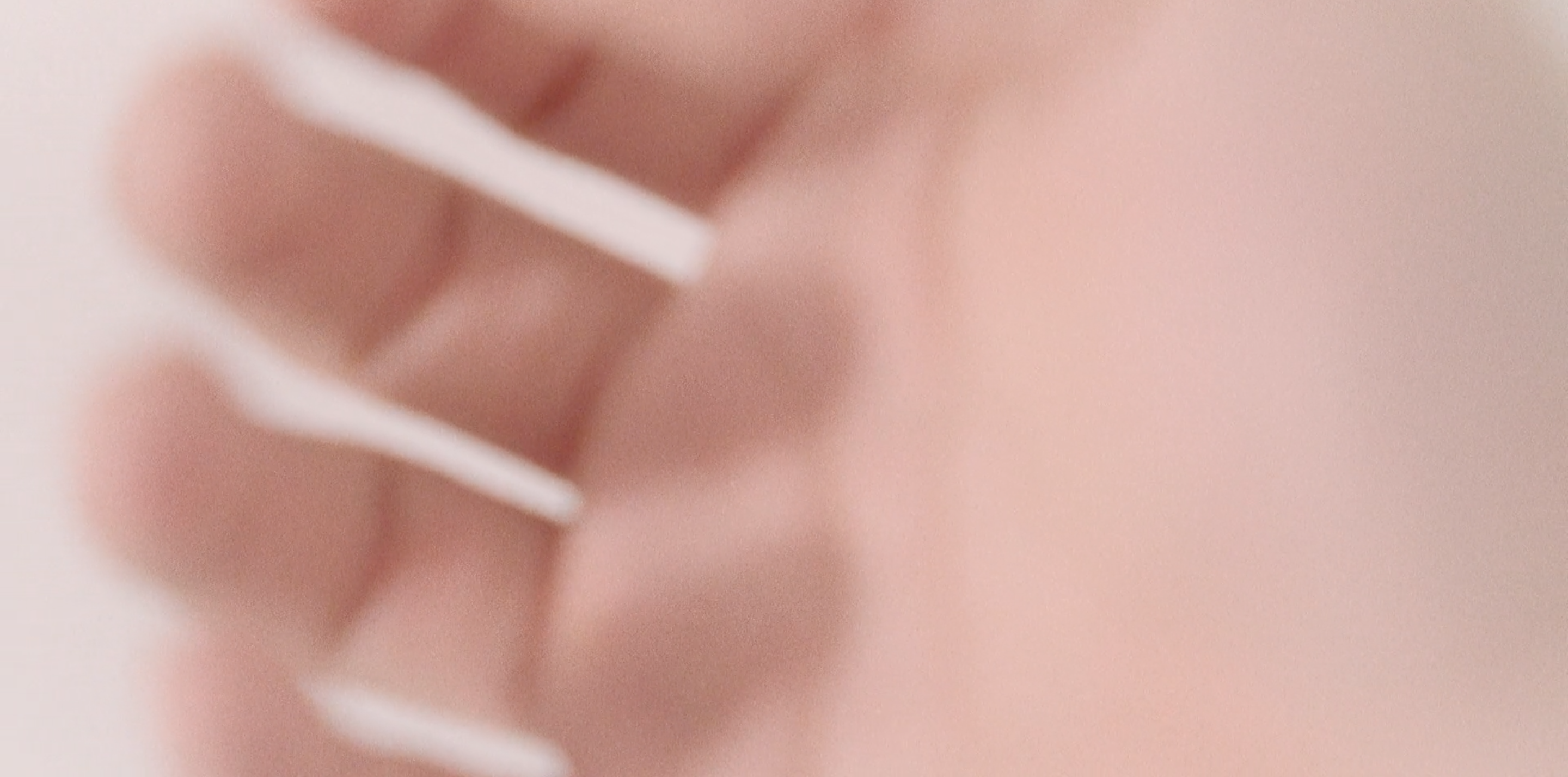
Chasing the Sun (2018), extreme close-up shots of a hand with a humming voiceover
Aroma on the other hand somewhat questions that, challenging the notion of memories and our perception of the experiences we go through in reality versus what actually remains in our memory. Whereas Chasing somewhat assumed that those moments on the screen are aspects of “truth” and “reality” (or related abstractions of the “truth” and “reality”), I wanted to explore the idea of our memories a bit deeper in Aroma by playing with our understanding of it through the relationship of two close friends and their environment.
Besides as a follow up of Chasing the Sun, there were a few other things that inspired Aroma. A few years ago, Brendan (the same Brendan in the film) told me how he would sometimes dream in black and white. I forget the exact context of our conversation, but for whatever reason that conversation stuck with me, and I found it fascinating how someone can dream in black and white. Would you know if you were dreaming in black and white? Would it seem less “realistic” since we see the world around us in color when we’re awake?
Taking that into consideration, I had Brendan in the film say that specific line to Steven (who is also actually Steven in real life) who, like me, attempts to visualize and understand the thought of dreaming in black and white. He tries to process it in an almost scientific way, responding with“...maybe it’s a biological thing” to Brendan.
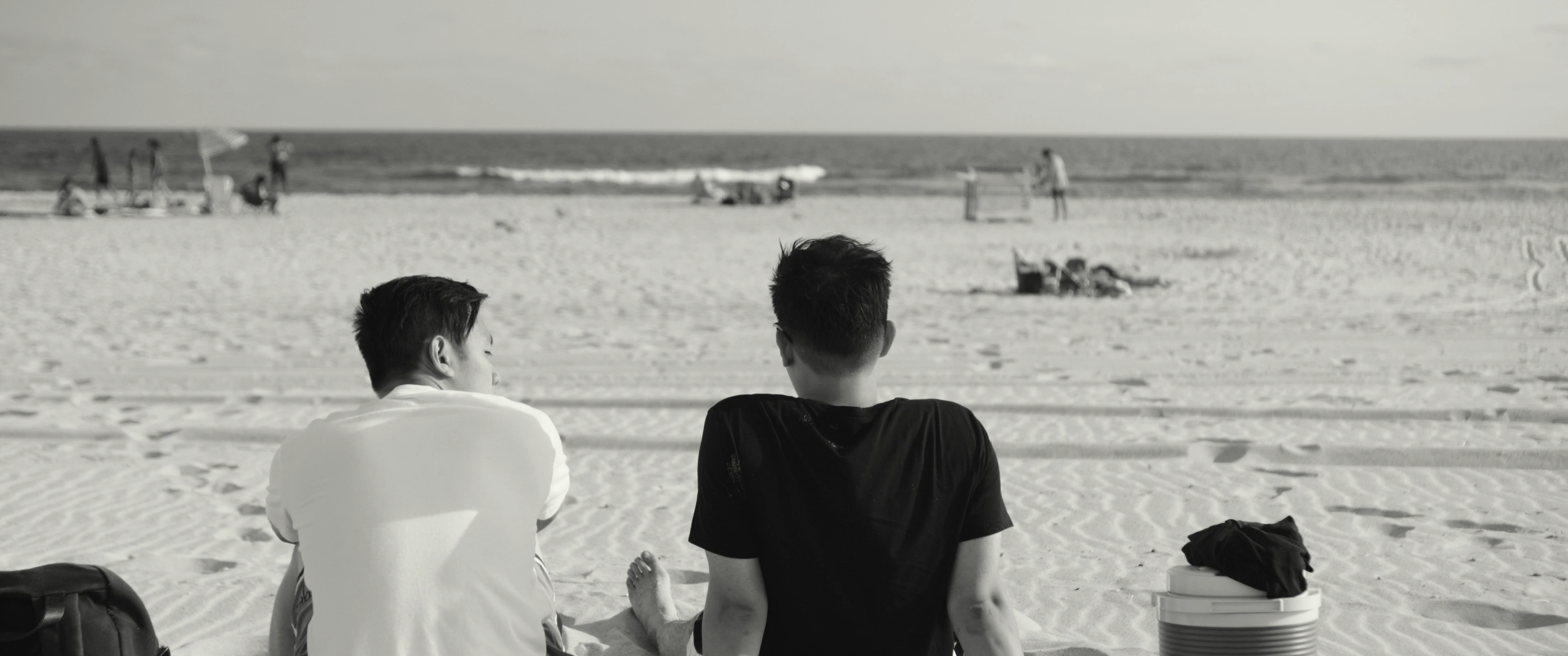
That one line inspired (for the most part) the black and white aesthetic for the film, which also begs the question: what if the entirety of the film is the very dream Brendan is talking about?
Another interesting point I’ve realized is that, for a lot of us, black and white photographs and film often evoke a sense of “history” and “passed time," a reflection of the period in time where color photography or film didn’t exist yet. Because we may see these artifacts through the lens of history, we might be tempted to consider them as “memories” or “recollections” of the past. But in Aroma, that perception poses an interesting dynamic when we clash it against with the concept of black-and-white as an imaginary dream (according to Brendan). In Aroma, are we watching an objective view of something that happened in the past? Or is this all a mere imaginative collection of fictional moments?
Let There be Color

To take this relationship further, there’s a moment later on in the film where the video cuts to black, and suddenly we see a shot of a saturated green forest. A dream-like floating camera tracks across the forest, cuts to a close-up side profile of Brendan, then of Steven (with voiceover of their lines, out of sync). This brings us back to a similar point that I mentioned before: if black-and- white visuals evoke a feeling of memory and the past while color imagery is perceived as current "reality" just because most of us see our own world in color, then what does this sudden change in color palette say in regards to that very argument? In addition to the visual shift, how does the change in audio quality also contribute to (or go against) that argument?
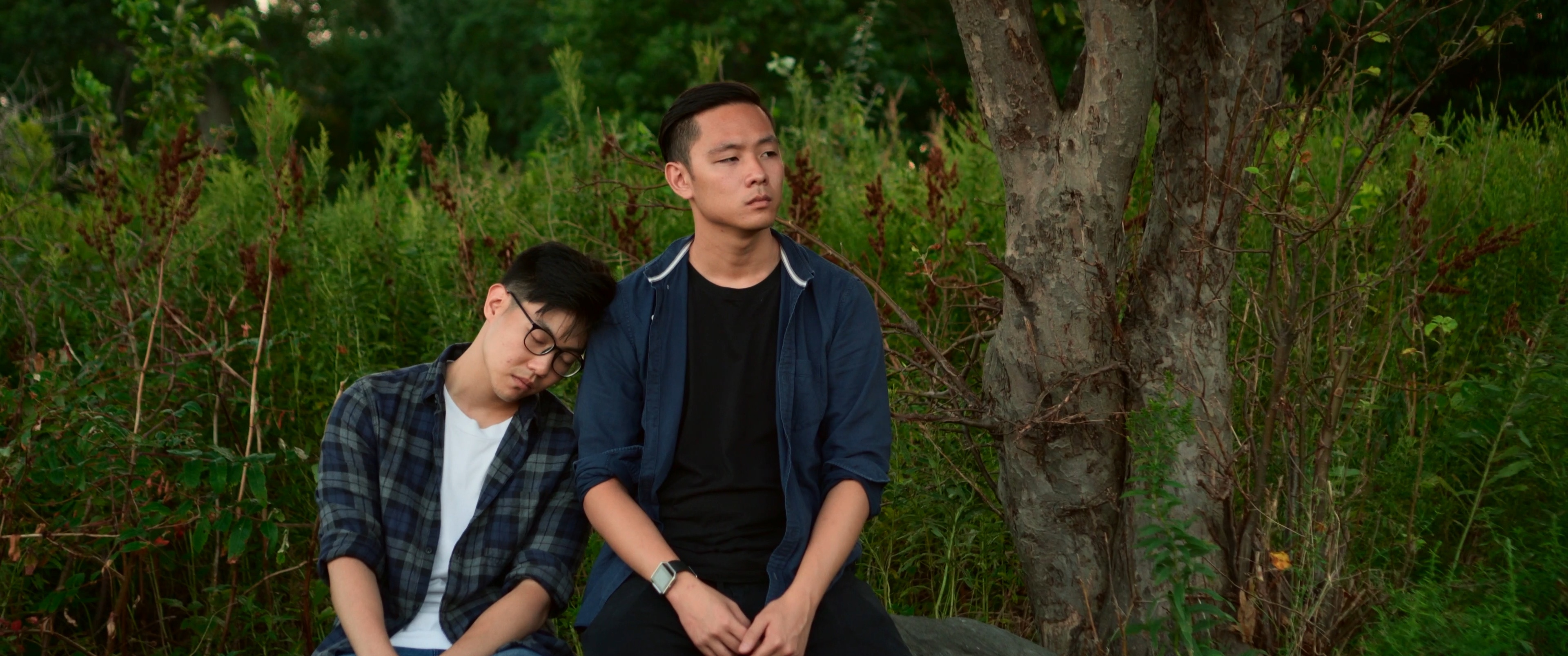
A friend of mine after watching the film messaged me, “Was the black and white part all a dream? Why does it seem like the colored part seems more like a dream?”
When he asked me this, all I did was smile.
On the Aspect of Intimacy
Slightly off tangent, I also want to briefly touch upon this idea of intimacy. In the frame just above, Brendan gradually leans his head on Steven’s shoulder after the two walk in the forest for some time. This scene is a direct reflection of a scene from Chasing the Sun when we see a woman (Clara) lean her head against another person (Grace) in the car.

Chasing the Sun (2018), a woman leaning her head on a stranger after getting in the car
I’m not sure why this imagery is something that has stuck with me, but there was a part of me that wanted to carry this idea over to Aroma, maybe to explore the garden/forest as a place of rest, and how rest can be a (shared?) intimate experience with someone else. There's something significant about that one small gesture that seems to represent a special form of connection that goes beyond just physical nearness.
Despite Brendan and Steven’s inability to verbally communicate clearly with one another throughout the film and especially towards the end, there’s still an unspoken element of “trust” between them and in their friendship. It was an intentional decision to keep their relationship vague, and although some have asked exactly what their relationship is, that was never too much of an importance to me. Maybe in the grand-scheme of the overall film, their specific relationship may not be as critical as it may seem, but rather I find it more interesting how the frames we see and the audio we hear all work together to evoke something else.
On the Aspect of Memory
Talking about relationship, I think the more significant relationship happens between the two friends and the spaces they’re in. In many of the scenes, something about the environment reminds Steven and Brendan of a certain moment in the past. From the bakery to the beach, they see something and share a piece of themselves.
Funny enough while walking to the beach, Brendan tells Steven about this time when his family had to suddenly leave his home with only a suitcase full of clothes. That dialogue was inspired by my own personal memory of my own past, and it’s something I’m still not fully aware what happened to this day. There’s something strange about seeing a character on screen talk about such a hidden memory of mine.
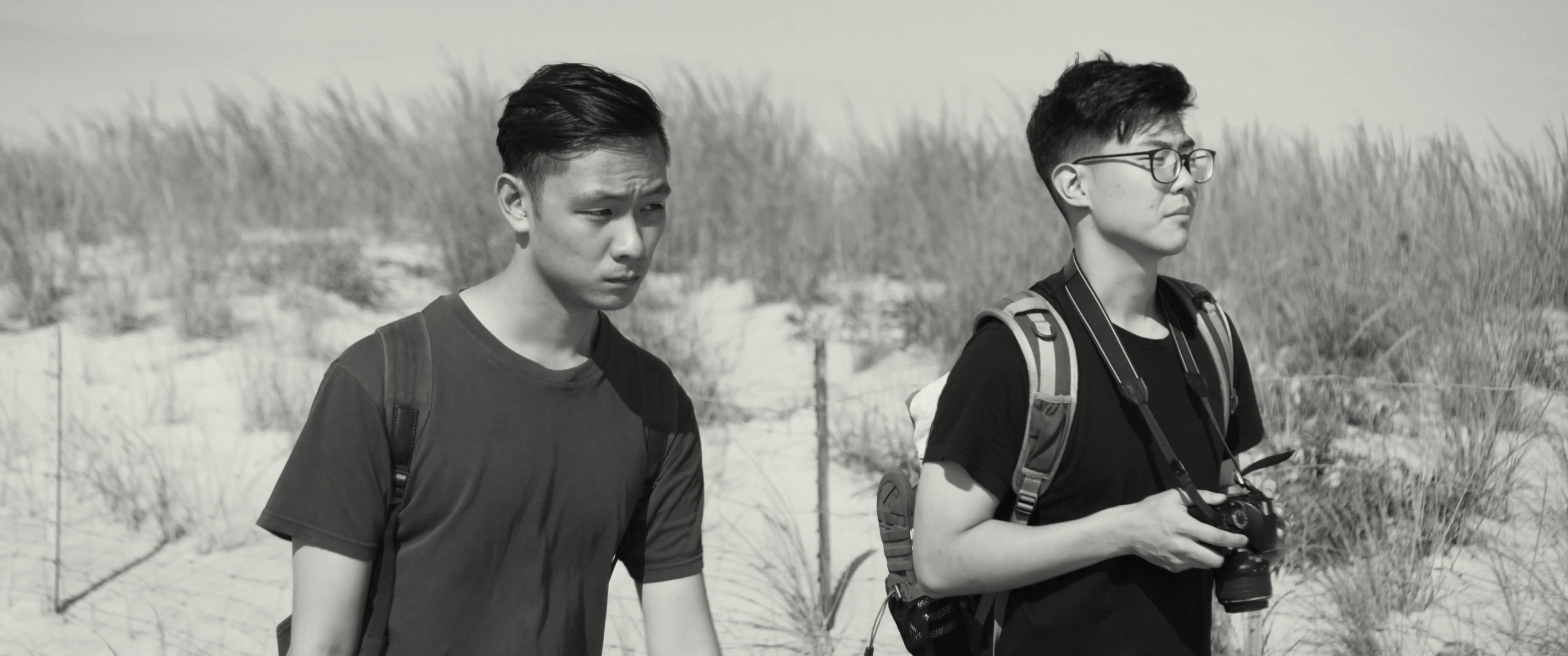
Lesson Learned
Unrelated to everything I’ve been talking about, there’s this one moment I wanted to share from our shoot.
To shoot the under/above water beach wave scene, I placed my camera inside this $50 waterproof plastic enclosure (it looked like a fancy ziplock bag, and I felt very nervous putting it in water). I also had a variable ND filter on a 35mm lens, and planned on shooting in 4K. I made all the adjustments, and then closed up the little baggie to seal the camera.
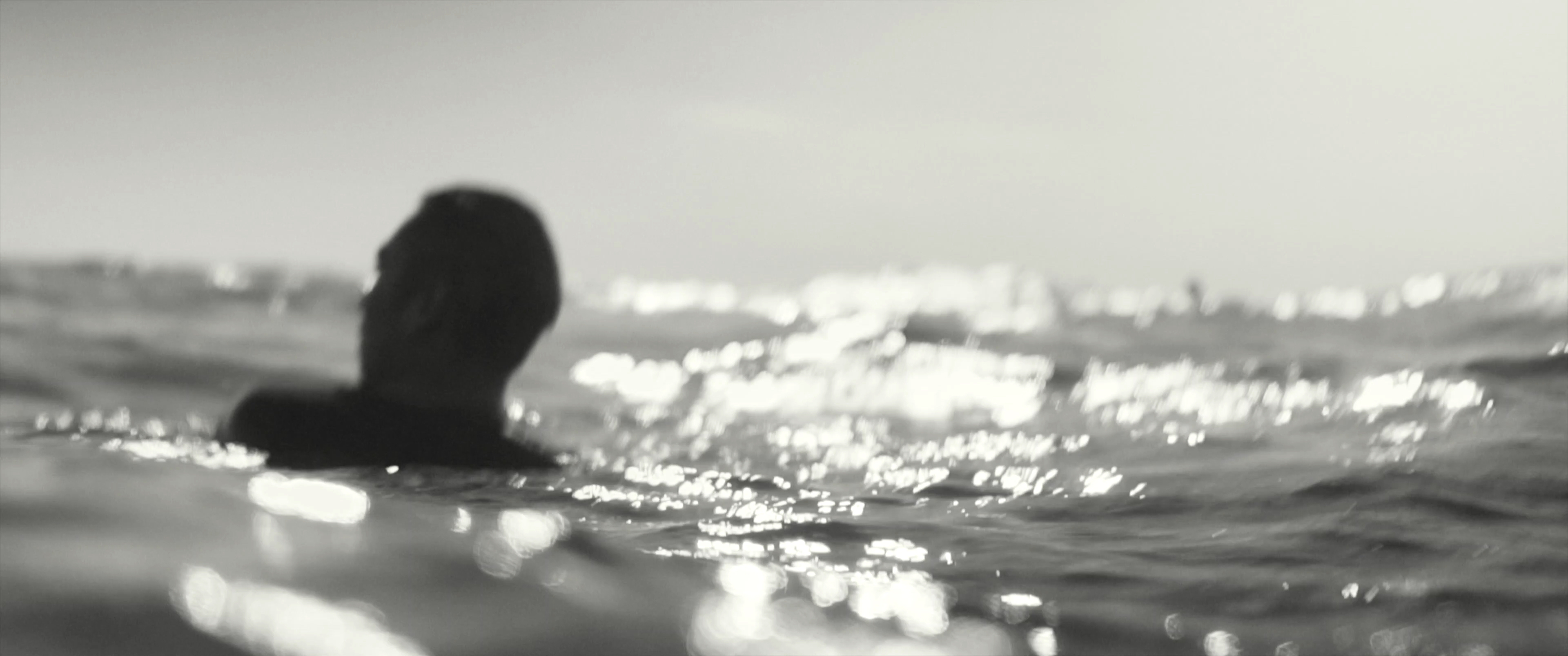
As soon as I got in the water with Steven and Brendan, somehow the variable ND filter got knocked out of place and became rotated to the darkest setting without my knowledge. With waves of water crashing on us, I thought my camera display went out (in 4K, the a6500 screen dims, making it even more difficult to see what's going on especially through the plastic enclosure).
Freaking out in the water while yelling at Steven and Brendan to “casually swim around,” I frantically changed the settings to shoot in 1080P (to brighten the display) and dramatically raised the ISO to compensate for the suddenly dark image (I didn’t realize it was the ND filter, I just assumed it was the dim display and the bright sunny day).
After aimlessly shooting around in the water, we went back to the shore and it was then that I realized the filter got knocked out of place. Unfortunately, we didn’t have time to keep shooting in the water and had to move on to the next location. I assumed the worst, and told myself the footage was going to be practically unusable.
After wrestling with the footage in post, to my surprise the shots came out decently OK. Although I wish I was able to shoot it in the original settings, I’m just glad we were able to use the shots. I should've prepared better, though.
A lesson learned indeed.
More for Later
There are many many other things I would like to word vomit and talk about: What are the seemingly random black frames near the end of the film? Why is Brendan alone at the last scene? What’s with the glasses? And why is Brendan always taking photos?
Maybe that’s something to be discussed at a later time, but I’m definitely a lot more interested in hearing what your interpretations and thoughts are... I think that’s part of the fun in viewing art films.
Frankly speaking, I don’t have clear answers to most of the questions brought up earlier; I still can’t exactly define what a memory is, nor can I fully describe the effects and purpose of memories in our lives. All I “know” is how it feels to have these memories impact us in an emotional and possibly even in a spiritual way. Sometimes it’s a frustrating longing for the “good times” of the past, sometimes a sorrowful glimpse of the possible joy in the distant future that we cannot attain today.
Aroma of the Garden in a sense is just that: an aroma. It’s that pass-by-a-bakery and whiff experience, breathing in briefly the decadent smell of freshly baked bread that reminds us of something good in the past that used to fulfill us, the sorrow of today because we lost that very good thing, and the hope and longing for a time in the future that maybe, just maybe, we’ll be able to attain that same good (or perhaps even greater) thing that will satisfy our deep inner need. It’s like that of the Garden of Eden, and all we have for today is the aroma of that perfect and wholesome world of the past, glimpses of a world that is both so foreign and intimate to us at the same time.
